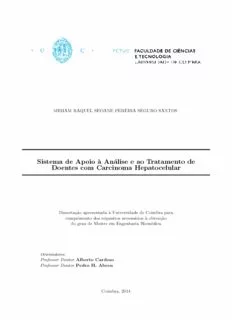
Sistema de Apoio `a Análise e ao Tratamento de Doentes com Carcinoma Hepatocelular PDF
Preview Sistema de Apoio `a Análise e ao Tratamento de Doentes com Carcinoma Hepatocelular
MIRIAM RAQUEL SEOANE PEREIRA SEGURO SANTOS Sistema de Apoio `a An´alise e ao Tratamento de Doentes com Carcinoma Hepatocelular Disserta¸ca˜o apresentada `a Universidade de Coimbra para cumprimento dos requisitos necess´arios `a obten¸ca˜o do grau de Mestre em Engenharia Biom´edica Orientadores: Professor Doutor Alberto Cardoso Professor Doutor Pedro H. Abreu Coimbra, 2014 Este trabalho foi desenvolvido em colabora¸ca˜o com: Centro de Inform´atica e Sistemas da Universidade de Coimbra (CISUC) Centro Hospitalar e Universit´ario de Coimbra (CHUC) Esta co´pia da tese ´e fornecida na condic¸˜ao de que quem a consulta reconhece que os direitos de autor sa˜o perten¸ca do autor da tese e que nenhuma cita¸ca˜o ou informa¸ca˜o obtida a partir dela pode ser publicada sem a referˆencia apropriada. This copy of the thesis has been supplied under the condition that anyone who consults it is understood to recognize that its copyright rests with its author and that no quotation from the thesis and no information derived from it may be published without proper acknowledgement. Abstract Liver cancer is the sixth most frequently diagnosed cancer and the third cause of cancer- related deaths worldwide. Hepatocellular Carcinoma (HCC) represents more than 90% of primary liver cancers and it’s a major global health problem. Clinical guidelines aim to assist clinicians in their decision-making process, under the assumptions of Evidence-Based Medicine (EBM). However, clinical practice often deals with the mismatch between EBM and the desired Personalized Medicine (PM), adjusted to a given patient. In order to make a reasoned decision, clinicians frequently need to access the patient’s information, which is a difficult quest in the great majority of hospital contexts. The patient’s clinical files are often dispersed in physical files, subjected to loss and inconsistency. Furthermore, such scenario also makes patient’s clinical data susceptible to missing data. In this work, we present a Clinical Decision Support System (CDSS) for managing clinical data of HCC patients, and an Artificial Intelligence (AI) module to be integrated with the developed CDSS. We have conducted several clustering approaches to profile a HCC patients database with heterogeneous and missing data. Our analysis led to the patients division into two groups, G1 and G2, with statistically significant overall survivals. HCC stage C patients were present in both groups, which suggested some heterogeneity between these patients. We have also performed some classification studies in order to access group assignment for a new patient presented to our CDSS. In brief, we have developed a framework that allows cancer data management in the HCC context. Our results show that it is possible to develop a CDSS for HCC patients which integ- rates clinical data management with AI techniques, targeting the treatment of these patients within the paradigms of PM. We have demonstrated that CDSSs allow the clinicians access to the patients’ clinical data at all times, while supporting them in their daily decisions. Keywords: Hepatocellular Carcinoma (HCC), Evidence-Based Medicine (EBM), Person- alized Medicine (PM), Missing Data (MD), Imputation, Clinical Decision Support System (CDSS), Profiling Prognostic Groups, Cancer Data, Clustering, Artificial Intelligence (AI), clinical data i
Description: